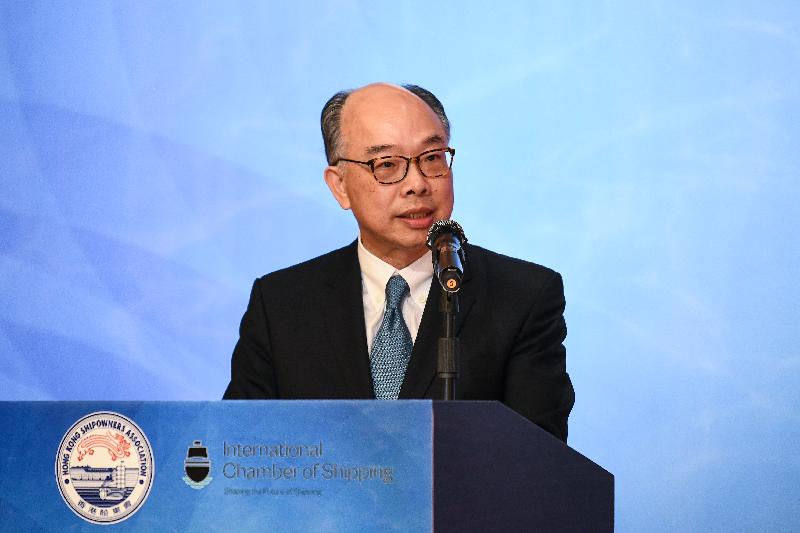Speech by STH at Hong Kong Shipowners Association Annual Cocktail Reception and International Chamber of Shipping (China) Liaison Office Launch Ceremony (English only) (with photo)
Following is the speech by the Secretary for Transport and Housing, Mr Frank Chan Fan, at the Hong Kong Shipowners Association Annual Cocktail Reception and International Chamber of Shipping (China) Liaison Office Launch Ceremony today (November 21):
Vice Minister Liu (Vice Minister of Transport, Mr Liu Xiaoming), Deputy Director Huang (Deputy Director of the Hong Kong and Macao Affairs Office of the State Council, Mr Huang Liuquan), Bjorn (Chairman of Hong Kong Shipowners Association, Mr Bjorn Hojgaard), Esben (Chairman of International Chamber of Shipping, Mr Esben Poulsson), distinguished guests, ladies and gentlemen,
Good evening. I am delighted to be here with you for the annual reception of the Hong Kong Shipowners Association (HKSOA). Now into its 62nd year, the HKSOA has become one of the largest, most respected voices in global shipping. The Government of the HKSAR (Hong Kong Special Administrative Region) fully appreciates the contribution of the HKSOA to our maritime industry, our economy and the future of Hong Kong. We could not have asked for a more trustworthy partner and are truly grateful for the unfailing support all along.
Tonight’s reception also marks the official launch of the Liaison Office of the International Chamber of Shipping (ICS). Established in 1921, ICS is the largest trade association for shipowners and operators. It represents more than 80 per cent of the world’s merchant fleet and all sectors of the industry. The decision to have its first ever Liaison Office based right here in Hong Kong is clear recognition of China’s emergence as one of the world’s leading maritime nations, and also Hong Kong’s superb connectivity with the global shipping community.
Hong Kong is a small city of 1 100 square kilometres with a population of 7.4 million. Given our limited domestic market, we ceaselessly reach out to the world. Strategically located in the heart of Asia and being the southern gateway to Mainland China, Hong Kong’s shipping and trading venture has come a long way, and was the world’s seventh largest trading economy of goods in 2018.
The first scheduled container ship berthed at Hong Kong on July 30, 1969. Fifty years since then, a throughput of 19.6 million TEUs were handled in 2018. Once a small fishing village back then, we are now the home base for shipowners who own or manage a near 2 200 ships. In 2018, some 280 million tonnes of cargoes were moved through our Kwai Tsing Container Terminals. Our maritime and shipping industry is truly a pillar underpinning the trade and logistics industry, which accounts for 21 per cent of Hong Kong’s GDP and 19 per cent of total employment.
As a matter of fact, Hong Kong is blessed with immense opportunities arising from the Belt and Road Initiative and the Guangdong-Hong Kong-Macao Greater Bay Area development. The Greater Bay Area’s Outline Development Plan calls for Hong Kong to continue and excel as a premier international maritime centre.
Same as the dedication of the HKSOA to creating value for its members, we the Government are committed to supporting the growth of the maritime sector. We have announced various initiatives in the 2019 Policy Address, such as tax concessions for ship leasing and marine insurance business, funding injection for maritime manpower development, and setting up regional maritime desks worldwide to better support our shipowners.
As an externally oriented economy, we are not immune from the impact of global economic slowdown. For the first nine months of 2019, the total throughput at Hong Kong Port dipped 6.5 per cent compared to the same period in 2018. Amid external headwinds and domestic social unrest, we have to brace ourselves for the eventuality of an overall negative growth for 2019.
To ease the financial burden of various sectors, the Financial Secretary has announced a number of supporting measures. On maritime front, we would exempt a number of fees for ocean-going vessels for 12 months. We would also provide one-off survey fee subsidy and non-accountable fuel subsidy to local commercial vessels. Besides, to better support small and medium enterprises, a new 90 per cent guarantee for approved loans would be rolled out. The Government is proactively supporting enterprises in Hong Kong.
Indeed, we have gone through difficult times in the past and every time we have emerged stronger and more resilient than ever. Hand on heart, I am confident that Hong Kong will overcome and rise again. In closing, I wish the ICS, the HKSOA and every one of you a memorable evening and the best of business in the years to come. Thank you.


